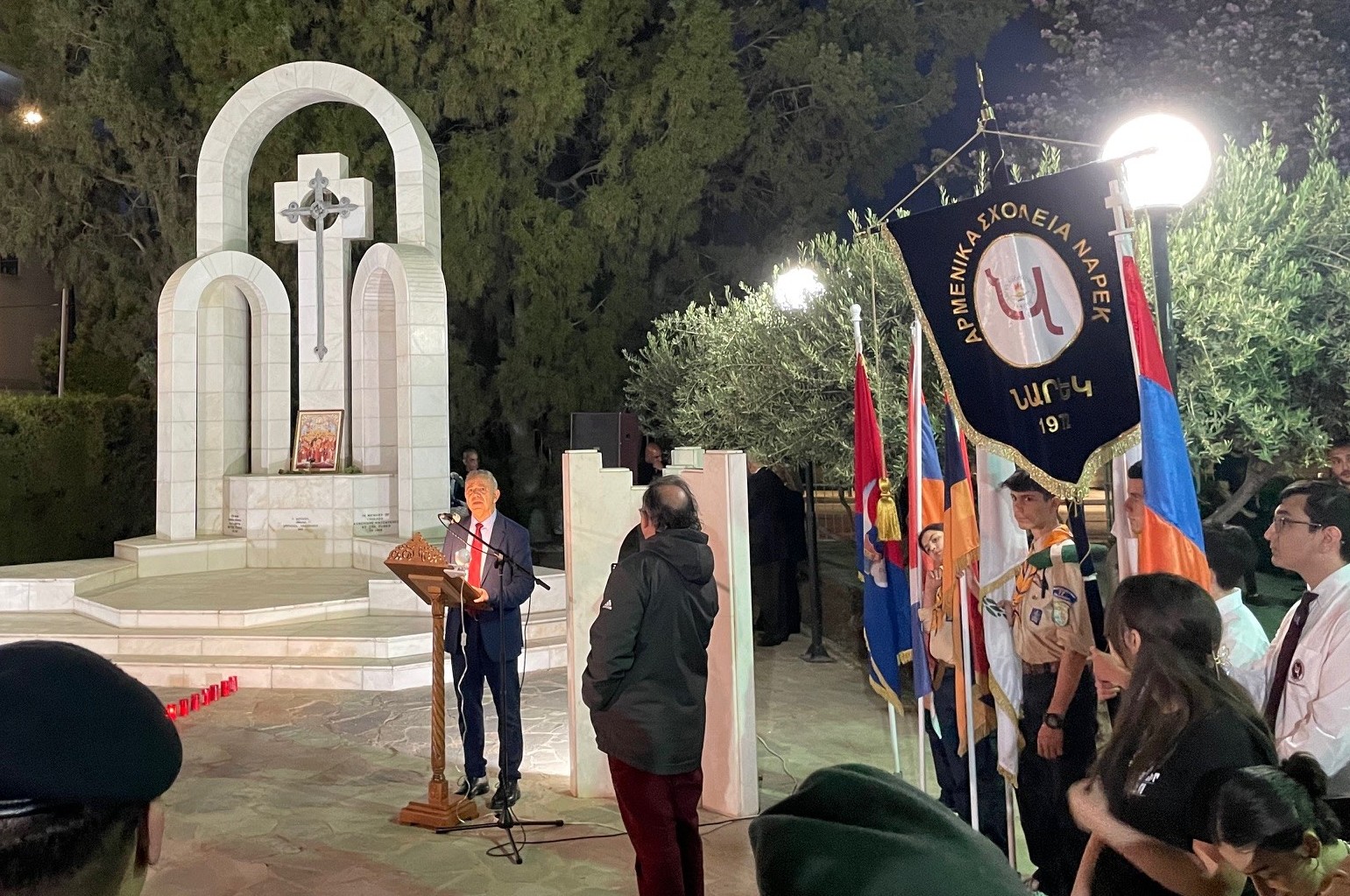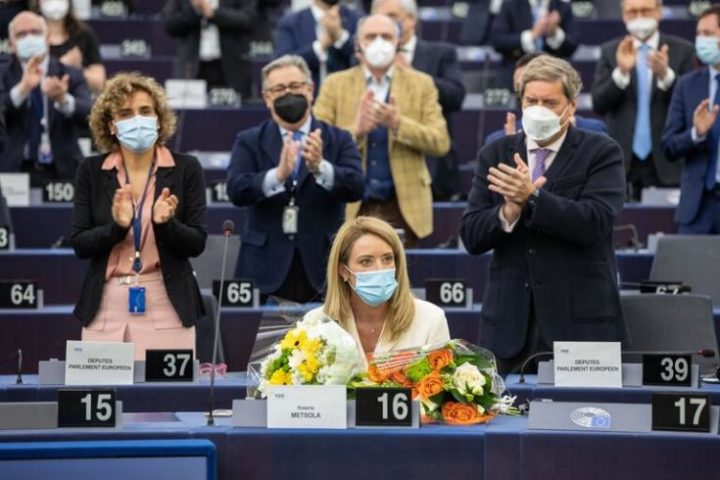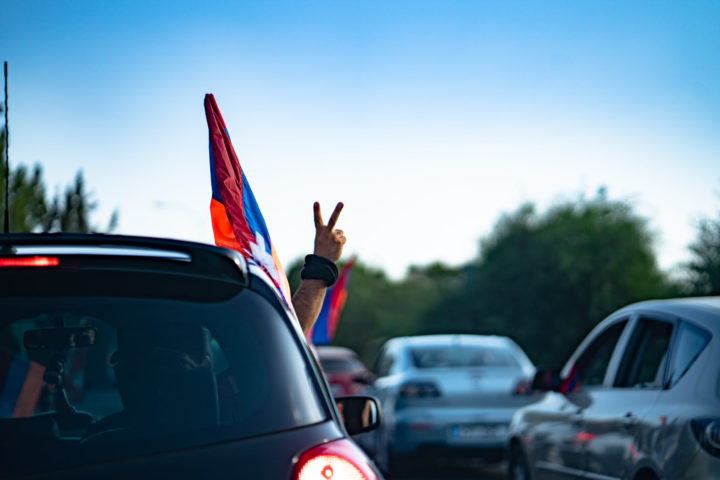A member of the European Parliament has called for solidarity with the Armenian nation in Genocide recognition, and more active cooperation in the common struggle for the truth.
As the keynote speaker at the Armenian Genocide remembrance ceremony in Nicosia, Costas Mavrides (DIKO, S&D) said that ‘truth’ in ancient Greek means the refusal to forget.
“This is what we are doing today. We commemorate the innocent victims and martyrs of one and a half million people of the Armenian Genocide, a fully documented crime that began on April 24, 1915, and lasted until 1923.
“By learning the truth about the atrocities of the Ottomans and Young Turks, we learn better about who we are, where we come from, and where we are headed. And, most importantly, we seek ways through truth and knowledge to prevent such crimes from happening again.”
In his address in the presence of House President Annita Demetriou and Armenian Archbishop Gomidas Ohanian, Mavrides said that one and a half million souls perished, including infants, children, women, men, the elderly, priests. People with dreams.
“Children who longed to grow up, parents with the concern to raise their children, grandparents who told stories at night so that their grandchildren would not be afraid of the Turks.
“That’s why I wonder, what minds, what seed, may have nurtured that satanic and organised plan to exterminate a Christian nation, a plan that was not created in a day.
“At the end of the 19th and beginning of the 20th centuries, the fanatical Ottomans and Young Turks decided to systematically exterminate the Armenians, as well as other Christian peoples, Greeks, Assyrians and others.
“However, the prelude to the Genocide were various massacres, mainly the ones ordered by Sultan Abdul Hamid and the Adana massacre in 1909 with the extermination of 25,000 Armenians and Assyrians.
“In a macabre way, the Adana massacre was linked to Cyprus and especially to the occupied region where I come from. For months after the massacres, dismembered and abused bodies of Armenians washed up on the beaches of Kyrenia and Karpasia. Mutilated bodies and human limbs, from the across the Asia Minor coast.
“A crime of unimaginable magnitude with brutalities and atrocities by the Turks, which cannot be described without provoking disgust due to the premeditated plan to exterminate the Christian people of Armenia.”
MEP Mavrides referred to the Ottoman Empire’s own data on the Armenian population, which recorded that at least one million souls were “missing” between 1915 and 1922, while recent scientific research suggests that more than 1.7 million were massacred or deported.
“There is evidence of the forced conversion to Islam of 100,000 orphaned Armenian children and 200,000 more Armenians converted to Islam to escape the slaughter.
‘Remnants of the sword’
“Those who remained in Turkey have since been called by the derogatory term ‘remnants of the sword’, that the new sultan of Ankara still uses in his rhetoric today, meaning that they escaped extermination and now live as Christian “parasites”.
“In today’s Turkey a significant number of Armenians live either as crypto-Christians, or as converts to Islam unaware of their origins or hide it out of fear, in a Turkey that continues to oppress Christian peoples.
“But now, the “sword of the new sultan” is also falling on other peoples, such as those of Muslim descent, Kurds, Alevis and Turkish progressives who refuse to align themselves with his aspirations.”
Mavrides described the unpunished crime of the systematic extermination of the Armenians, part of a years-long Genocide plan that included forced death marches where corpses filled streets and rivers, extermination camps, especially for women and children with unimaginable crimes committed against them.
The atrocities continued with horrific holocausts by burning alive thousands of Armenians and Greeks in Pontus, including infants as the fastest method of “ridding” of the Armenian population, as well as the poisoning and drowning after being loaded onto ships and sunk into the sea.
“The Armenian Genocide was not only the physical extermination and annihilation of a people, but also the elimination of every trace of their history and culture,” the Cypriot MEP said.
Referring to his home country, Mavrides said that, “between 1915 and 1923, Cyprus received several thousand Armenian refugees. Their presence strengthened the small community of Armenians and now they are a living part of our homeland, although they, too, lost homes, churches, schools and monasteries in the Turkish invasion of 1974.
“As cultured and progressive people, we are proud that in combination with their hard work and dedication, they managed to stand on their feet and contribute substantially to our common homeland, always having in mind the unforgettable homelands of Pontus, Cappadocia, Armenia, Artsakh.
“Among 34 countries, Cyprus is the second in the world and the first in Europe to officially recognise the Armenian Genocide in 1975. The European Parliament is also included in the organisations that recognised the Armenian Genocide. I also refer to 2015 when, following the initiative of the Representative of the Armenian community in Cyprus, Vartkes Mahdessian, the Cyprus parliament criminalised the denial of the Armenian Genocide.”
The denial of the Genocide by Turkey, and especially by the current neo-Ottoman regime, is part and continuation of the original crime and at the same time constitutes the seed for the repetition of such crimes, Mavrides added.
“We defend the truth, namely the refusal of forgetting and for this we have a responsibility to do everything so that we do not experience such barbarity again.”
‘We are not alone’
In her address at the Genocide commemoration in Nicosia, Armenia’s Ambassador to Cyprus, Inna Torgomyan, said that “every Armenian carries the memory of this tragedy. Behind each family name there is a story passing from generation to generation — each one is a unique tragedy, a testament to loss and survival.
“We bow our heads in remembrance of the holy martyrs and reaffirm that we remember. And we are not alone — millions across the world, and many countries, stand with us.
“Brotherly Cyprus holds a special place in this story. It became a refuge and second homeland for thousands of survivors, offering shelter, dignity, and a future. For this, we are eternally grateful to authorities and the people of Cyprus.
“Our very presence here today is proof that the ultimate goal of the architects of the Armenian Genocide has failed. The very existence of Armenians and the Republic of Armenia, stand as our response.
“The Republic of Armenia has assumed responsibility of leading the Genocide prevention agenda to stand for justice, truth, and the prevention of future genocides and crimes against humanity.
Ambassador Torgomyan concluded: “to those who tried to erase us, we say: we stand. And we always will.”
Taking advantage
Concluding the week-long commemoration events, that included blood donation in Nicosia and Limassol, film screenings and vigils in churches and community centres, Representative Mahdessian said that the Turkish-Islamic nationalism flourished after the Turkish-Italian war of 1912 and the Balkan wars of 1912-1913, and culminated with the breakout of the first world war in 1914.
“Taking advantage of the great conflict between the Great Powers, the rabid Young Turks enforced their diabolical plan for a panturanic empire, among purely turkic people.”
“Five decades later, the hospitable island of Cyprus, where our generation was born and raised, had the misfortune to fall victim to the Turkish atrocities in the dark summer of 1974. Some 200,000 of our fellow Cypriots became refugees, just like our people a century ago.
Mahdessian said that despite its own problems, Cyprus has continuously supported the Armenian community and the recently, the Republic of Armenia, expressing his heartfelt gratitude.
“Some 51 years after the Turkish invasion, Cyprus remains divided and partly occupied. Taking advantage of its relationship with the European Union and the United States, Turkey arrogantly continues to harass its neighbours in Cyprus, Armenia, Syria and Greece, together with its satellite Azerbaijan.
“As a result, Turkey’s continued occupation of the north of Syria since 2016 remains unpunished, as well as the occupation of Nagorno Karabagh (Artsakh) in 2023 by the Azeris, violently uprooting 120,000 Armenians and destroying all historical and religious grounds.
“For three years now, world powers, driven by their own interest, continue to finance and support Ukraine, while in the case of smaller nations such as Cyprus and Armenia, they resort to meaningless declarations and support.
“Cypriots and Armenians stand together in their common and just struggle for survival, on a fragile international chessboard that we live in,” concluded Mahdessian.
The Armenian Representative will address the Cyprus parliament in his annual address and Genocide Commemoration on May 8.










